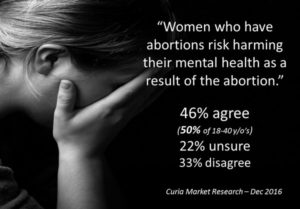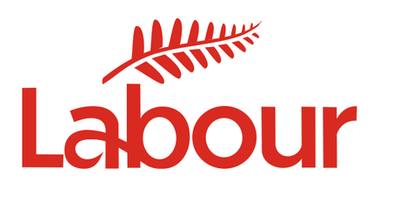Women Having Abortions Risk Mental Health – Poll
 Media Release 15 March 2017
Media Release 15 March 2017
A poll has found that half of NZ’ers in the 18-40 age bracket believe that women risk harming their mental health as a result of having an abortion.
The independent poll commissioned by Family First NZ and carried out by Curia Market Research asked respondents whether they agreed with the following statement: “Women who have abortions risk harming their mental health as a result of the abortion.” Overall, almost half (46%) agreed with the statement, 22% were unsure or didn’t say, and only 33% disagreed. There was little difference between male and female respondents. Significantly, strongest agreement with the statement came from the younger 18-40 age bracket (50%).
“This is the unheard discussion around abortion. From personal experience, and from the hundreds of women who have contacted me through the Buttons Project, I know that there is a mental health component to having an abortion – but no-one wants to talk about it. Yet this poll reveals that many people are aware, especially the younger generations. That is a positive,” says Marina Young, spokesperson for Family First NZ and founder of the Buttons Project.
“Abortion can harm a women, but pro-abortion groups refuse to acknowledge this, seeing the right to abortion more paramount than the long-term health and welfare of the women involved. We believe women have the right to the best independent information and advice before making a decision that could impact them later in life,” says Mrs Young.
A University of Otago study in 2008 found that women who had an abortion faced a 30% increase in the risk of developing common mental health problems such as depression and anxiety.
And a research paper entitled “Does abortion reduce the mental health risks of unwanted or unintended pregnancy? A re-appraisal of the evidence” by Professor David Fergusson, John Horwood, and Joseph Boden which was published in the 2013 edition of the Australian and New Zealand Journal of Psychiatry concluded that the evidence shows that abortion was not associated with a reduction in rates of mental health problems, but was associated with increases in risks of anxiety, alcohol and drug misuse, and suicidal behavior. They state: “There is no available evidence to suggest that abortion has therapeutic effects in reducing the mental health risks of unwanted or unintended pregnancy. There is suggestive evidence that abortion may be associated with small to moderate increases in risks of some mental health problems.”
A meta-analysis of 22 studies and over 877,000 participants over a 14-year period, published in 2011 in the British Journal of Psychiatry, revealed that 81% of females who had an abortion were found to be at an increased risk for mental health problems, including depression, alcohol abuse and suicidal behaviors. The study also revealed that as many as 10% of all mental health problems are directly attributable to abortion. The Royal College of Psychiatrists in the UK have recommended updating abortion information leaflets to include details of the risks of depression. They said that consent could not be informed without the provision of adequate and appropriate information.
In a poll of NZ’ers in 2011, the majority of New Zealanders (64%) said that women considering abortion have the right to be fully informed of the medical risks of abortion – and the alternatives.
“Family First NZ believes that any attempts to liberalise the laws around abortion in New Zealand would cause more harm than good to women. It is time that the research on the post-abortion mental health outcomes was given equal weight against the pro-abortion claims of ‘benefits’,” says Mrs Young.
READ FULL RESULTS
ENDS





